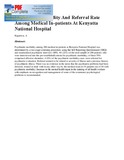| dc.contributor.author | Kigamwa, A | |
| dc.date.accessioned | 2013-04-27T08:54:34Z | |
| dc.date.available | 2013-04-27T08:54:34Z | |
| dc.date.issued | 1991 | |
| dc.identifier.citation | East Afr Med J. 1991 May;68(5):383-8. | en |
| dc.identifier.uri | http://www.ncbi.nlm.nih.gov/pubmed/1935734 | |
| dc.identifier.uri | http://erepository.uonbi.ac.ke:8080/xmlui/handle/123456789/17293 | |
| dc.description.abstract | Psychiatric morbidity among 200 medical in-patients at Kenyatta National Hospital was determined by a two-stage screening procedure, using the Self Reporting Questionnaire (SRQ) and standardized psychiatric interview (SPI). 44 (22%) of the total sample of 200 patients who were interviewed met the pre-established criteria for psychiatric morbidity; of these 59% comprised affective disorders. 4 (9%) of the psychiatric morbidity cases were referred for psychiatric evaluation. Referral seemed to be related to severity of illness and a previous history of psychiatric illness. There was no evidence in the notes that the psychiatric problems had been detected, treated or dealt with in any other way by the medical team in 34 patients out of 44 with psychiatric morbidity. Increase in the mental health input in the training of all health workers with emphasis on recognition and management of some of the commoner psychological problems is recommended. | en |
| dc.language.iso | en | en |
| dc.title | Psychiatric Morbidity And Referral Rate Among Medical In-patients At Kenyatta National Hospital | en |
| dc.type | Article | en |
| local.publisher | Department of Psychiatry, College of Health Sciences, University of Nairobi. | en |

